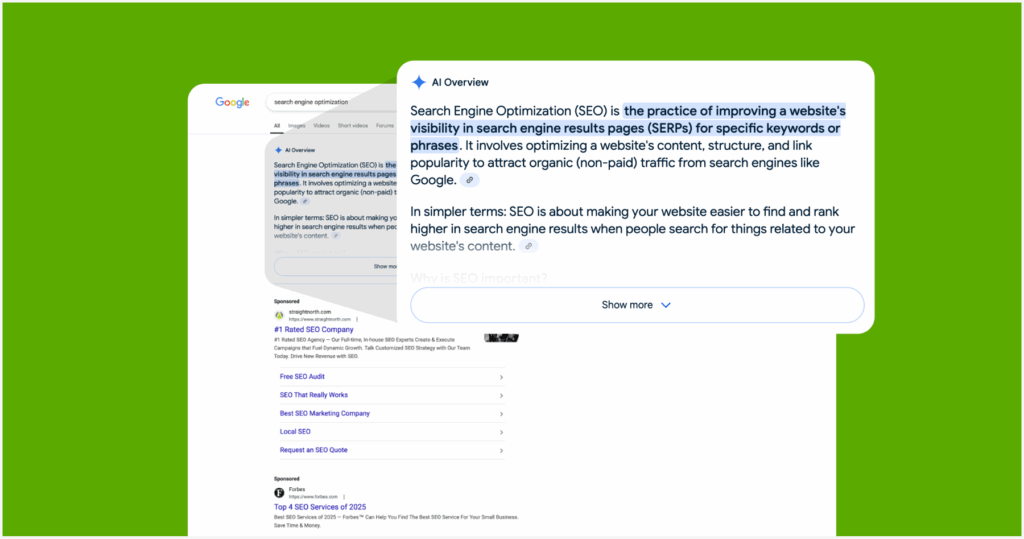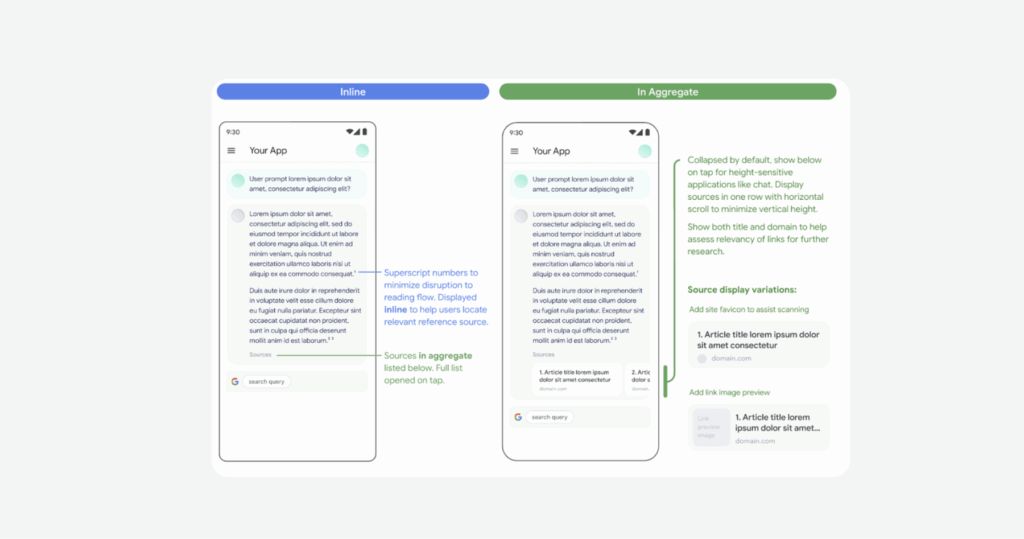
TL;DR:
Search used to be simple: rank higher, get more clicks. But now? Search is being rewritten by artificial intelligence. Google’s AI Overviews and ChatGPT summarize the internet before users even reach your site—and if your content isn’t in those summaries, it may as well not exist.
“SEO has changed—AI now dictates visibility,” says Kalina MacKay, SVP of Owned Media at Go Fish Digital. “If your content isn’t structured in a way that AI can interpret and trust, it’s likely not being seen.”
And the shift isn’t small. AI Overviews are appearing in more search results every week. According to Ahrefs, “the presence of an AI Overview in the search results correlated with a 34.5% lower average clickthrough rate for the top-ranking page.”
At the same time, traffic from ChatGPT to customer sites has jumped by more than 200% since its search feature went live for all users.

AI isn’t indexing the web the way traditional search engines do. It’s interpreting intent, scanning for semantic similarity, and choosing sources that align with its understanding of a topic—not just who ranks #1 on Google.
“Pages that are semantically similar to user prompts are more likely to be included,” explains MacKay. “It’s not about being the loudest—it’s about being the most contextually aligned.”
AI-driven inclusion relies on a new discipline: Answer Engine Optimization (AEO). It means structuring your site with clear headers, bulleted lists, and question/answer formats that mirror how users phrase queries.
Heavy “If AI can’t understand your content, it won’t use it,” says Dan Hinckley, Co-founder of Go Fish. “And in most cases, that comes down to structure.”
Go Fish built a proprietary Semantic Content Audit tool to close this gap. It compares a site’s content to the actual text being surfaced in AI Overviews. The audit reveals where you’re aligned, where you’re not, and what’s keeping your brand out of the conversation.
Hinckley says, “We’ve had clients get included in AI Overviews just hours after making structural updates. It’s not just about what you’re saying—it’s how you format it.”
Case in Point: One brand added structured Q&A blocks to a category page. Within 24 hours, it was cited in Google’s AI Overview for a high-converting keyword—leading to a 28% jump in organic sessions for that page.

Here’s a surprising twist: ChatGPT doesn’t only rely on OpenAI’s internal data—it pulls live search results from Microsoft’s Bing. That means Bing Webmaster Tools and IndexNow aren’t just nice-to-haves anymore—they’re crucial components of your AI SEO strategy.
“The search functionality was built with ‘a mix of search technologies,’ including Microsoft’s Bing,” said Adam Fry, ChatGPT’s Search Lead.
For brands focused purely on Google, this creates an invisible risk. Bing might only power around 10% of traditional search traffic—but it feeds 100% of ChatGPT’s live search experiences. And with ChatGPT already driving a 200%+ increase in organic traffic for some sites, that ecosystem can’t be ignored.
It’s not just about showing up faster, either. IndexNow allows your website to instantly notify Bing (and other participating AI systems) when you publish, update, or remove pages. That means:
Tactical Next Step:
AI is speeding up the life cycle of search content—and Bing and IndexNow give you the fast lane to show up where it matters.
In an AI-first world, citations are currency. When large language models like ChatGPT summarize the internet, they favor brands and information that have been widely co-cited across multiple trusted sources—not just those with high-authority backlinks.
“Get mentioned in authoritative industry content,” says Kalina MacKay. “Beyond earning links, being referenced in the data that trains these models is huge for visibility.”
And the stakes are rising. OpenAI has formal partnerships with major media outlets like The New York Times, NPR, and others. Publications like these contribute directly to the training datasets that power tools like ChatGPT.
That means a feature story, quote, or citation in these environments doesn’t just build credibility with readers—it actively shapes what AI systems know about your brand.
62% of marketers believe digital PR will have the biggest impact on AI visibility over the next two years. Forward-thinking brands are already adjusting their PR strategies to prioritize:
Tactical Next Step:
Rethink digital PR not just as a traffic-driving tool, but as a training-data influence strategy. Focus on securing mentions tied to your core products, brand name, and critical keywords in sources AI systems trust.
If your brand isn’t part of the internet’s consensus reality, AI systems will leave you out of the conversation.AOV and still drive meaningful conversion.
Known as “grounding,” LLMs like ChatGPT rely on verified, real-world sources to reduce hallucinations. That’s where press features, reviews, and online reputation come into play.
“AI-based search is more conversational,” MacKay adds. “Users are asking for opinions and reviews—and traditional PR helps shape how your brand is framed in those conversations.”

Showing up in ChatGPT and AI Overviews doesn’t require reinventing your SEO strategy—but it does demand an evolution. The brands that adapt fastest will be the ones that AI trusts to answer.
✅ Structure your content for semantic similarity and machine readability.
✅ Fill topic gaps with listicles and Q&A blocks.
✅ Use Bing and IndexNow to speed up visibility.
✅ Invest in digital PR to boost co-citations and brand authority.
✅ Audit your site to see where you’re being excluded—and why.
Get a custom free AI Visibility Audit from Go Fish Digital. We’ll analyze your structure, identify content gaps, and give you a roadmap to increase your visibility in AI-powered search. Because when AI summarizes the internet, your brand should be part of the answer.
